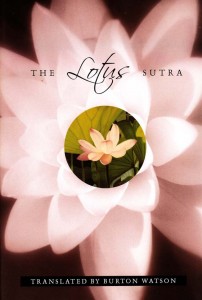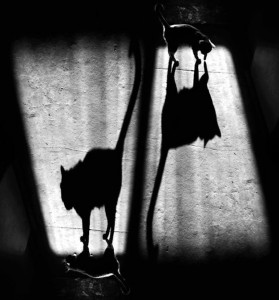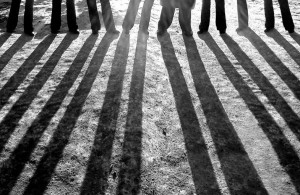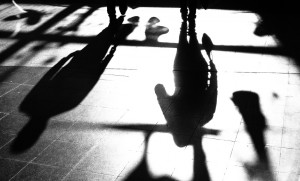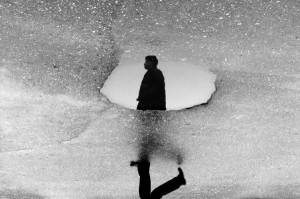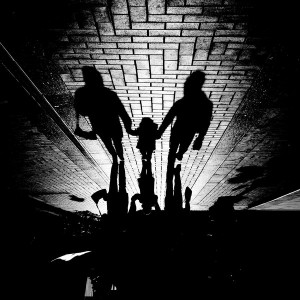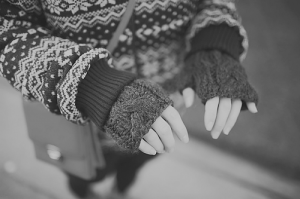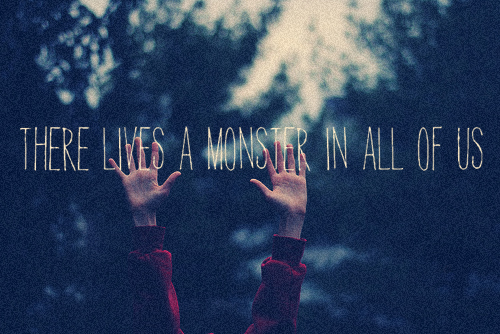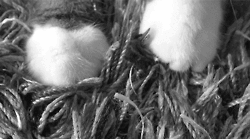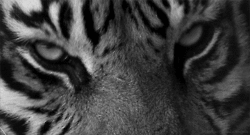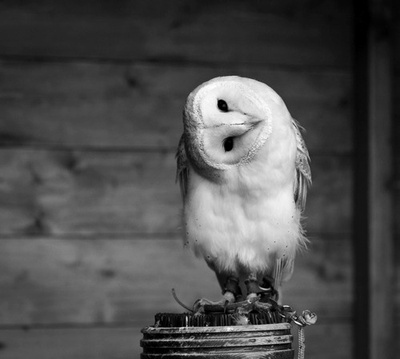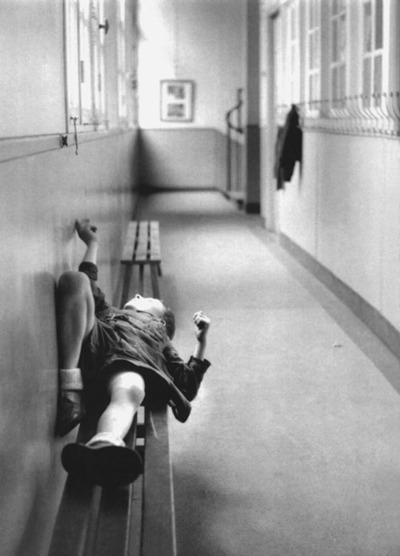I thought we’d begin with one of the most dramatic moments in Buddhist literature. It’s a scene that I used to imagine taking place in a kind of palace, where the candles would throw large flickering shadows on the walls, as if we were in the middle of a religious detective movie. But because this involves the Buddha, of course it’s happening outside, because they lived outside. The outside you could say, was their inside. What does it mean to make the outside, your inside?
Unlike the Buddha statues which only began to appear hundreds of years after his death – the first monasteries only had geometric forms – the Buddha is this really thin dude. If you read Mu Soeng’s essay in Freeing the Body, Freeing the Mind, the middle way meant one meal a day, always begged, and you owned one sketchy robe and you only sleep a few hours a night and never lying down. So in this scene there’s this by now very old and thin and not very healthy guy coming to the end of his life, and he’s there with his walking hard drive of an attendant Ananda. Ananda asks the Buddha, “But what’s going to happen when you die? You need to pick someone to carry on the tradition, to carry the dharma.” And the Buddha says in effect, “What do I look like? A Buddhist?” Remember, there’s no church, no architecture, so the Buddha just refuses. He says, “No, I’m not going to name someone, there have been certain forms that have laid down, and within those forms everyone is going to find their own way.” Stephen Batchelor says the choice is between another Indian religion ruled by priests, or a culture of awakening that could produce another kind of civilization. And then he famously tells Ananda that he should take refuge in himself. Even before the Buddha, the dharma, the sangha, to take refuge in himself. What does it mean to make the outside, your inside? Does it mean taking refuge in yourself?
Money
This scene happens while the Buddha is on a trek back to his home town of Sakiya but he never makes it, he dies. And after he dies, there’s a rather predictable struggle for power, yes, even amongst those that are practicing the middle way. They start having these big meetings, these unconventional conventions, called Councils. At the first council, Ananda, a reluctant guest to say the least, is urged to repeat every teaching of the Buddha. There are other councils, and some take up the matter of money. Buddhism arises at a moment when the first cities in India are developing along the Ganges River, and it’s the surplus of these cities that supports the first sanghas, that makes the sangha possible. The economics of these cities, and the admittedly modest needs of those practicing the middle way, they come together. In one of these councils, or so the story goes, or so one of the stories goes, the question of money arises, and this question did what money almost always reliably does, it made a cut, it created a division, in this instance, between the old school Theravedans who said flat out that monks shouldn’t handle money, and the majority, the maha, the majority, who said, relax, it’s OK, there are cities and sometimes money is necessary to exchange in cities. We don’t need to be so tight.
The maha means the majority, or ‘great’ and yana means vehicle, the great vehicle. This Mahayana school moves from country to country, it leaves India and moves through what we now call Afghanistan and Pakistan and finds its way eventually into China and Japan and Tibet. And it’s in China that some of these Sankrit texts are hugely rewritten and reorganized. Every time Buddhism meets another culture, it transforms, it takes a very different shape. Tibetan Buddhism, for instance, looks so different, is practiced in such a different way, from Zen Buddhism in Japan, or Mahayana Buddhism in China or your Buddhism here in Toronto.
Shadows
Again and again through history, we see systems – of government, of institutions, the systems of your own life – which have found a way to see their own shadows. Or else they become rigid and die. How can you find your own shadow, using the flashlight of a personality which has been gathered around, clustered around a repertoire of beliefs which makes seeing this shadow impossible? If a system can find its own shadow, it can often take some element of itself in order to deal with that shadow, to bring it into visibility. Is that what Mahayana Buddhism is, a kind of shadow machine, a way of dealing with what could not be shown, of what had been left out?
When Mahayana Buddhism hits China, it begins a radical – radical meaning “to the roots” – reimagining of the entire project of Buddhism, and the central teachings are reorganized in a language that marks a sharp break from, for instance, the enormous heritage of texts that recount the Buddha’s teaching. Its form is different and its content is different. And one of the newly central texts is this sometimes bizarre, psychedelicious, eye popping, hippie precursor known as The Lotus Sutra. One of the incredible things about this book is that the Buddha says again and again: everything I have ever said in my life, everything you’ve ever heard out of my mouth, and about my teachings – that’s the lesser vehicle. But today, today for the first time, I’m going to teach you the greater vehicle, the single path. Can you imagine? That Mohammed gets to the very end of the Qur’an and then he says, surprise, all that stuff was just the prelude, that was the waiting room, but now, today, I’m going to give you the real teaching for the first time. Over and over again the Buddha says I’m going to teach the maha yana, the great vehicle. And he says some things about it, what it feels like, what it does, but he never says how to do it. He never delivers it as a practice, he never says this is how you move in the greater vehicle, this is what it looks like every day. In other words, at the heart of The Lotus Sutra, at the heart of this reformed and revised Buddhism there is a kind of refusal, a space, an emptiness.
In Japan, where Mahayana Buddhism was very important, and The Lotus Sutra was very important, this refusal, this emptiness, leads to two different schools. There was Nichiren, of the Nichiren school, who felt that you have to recite this particular passage (daimoku) over and over again, that’s how you realize the greater vehicle. Meanwhile his contemporary, Dogen, felt that sitting meditation, zazen, was the greater vehicle.
The point I think is not to get caught up in medieval Japan Zen politics, but to see that this book is not only about emptiness, it is a demonstration of emptiness. And why? Because I think the sutra is trying to get the reader to feel her or his own emptiness. As if you could reflect, in the act of reading, as if you could exchange two qualities of emptiness. As if you could meet the emptiness of this sutra with your own emptiness. It is a summoning, a kind of calling and reminder.
Yoga Psychology
Buddhist psychology, like Yoga psychology, says that the self is empty, in other words, there’s no such thing. There’s a sound, the floor is creaking, there’s a sense organ, this ear, and this sense organ meets this sound. The sound does not exist separately from my ear, my ear does not exist separately from the sound. The sound is not over there while I’m over here. We come together, we are creating each other, again and again, in this moment of contact, in this intimacy, this intimacy that is perception. What happens in that moment of intimacy? The sound and the sense organ come together, and the sound produces a vibration, a physical vibration, a physical sensation in the body. And then the fateful decision. I like that sound. Or else, I don’t like that sound. In choosing “I like” or “I don’t like,” what we call the self is born. The endless story telling. I like that sound because it reminds me of my best friend. I don’t like that sound because it reminds me of the person that used to be my best friend. These stories, these storytellings, keep us from being here, here in this moment, from hearing the creaking of that floor, not as my floor, not as my creaking. The floor, it’s hard for me to admit this, but when someone made this floor, they weren’t thinking about me. It’s kind of shocking to accept that I know, but when this floor creaks, it’s not creaking for me, and it’s not creaking against me. It’s not making a decision. The heart of the practice, I think, is about not making this decision. Which doesn’t mean being indecisive, but it means not deciding what you’re going to feel like before the event happens. What if you don’t need to hold on? Hey, why are you sitting on my cushion? Hey that’s my water in that jar. You’re breathing my oxygen. What if the world wasn’t arranged so that I could experience it? What if I was empty?
Father
The self doesn’t exist independently, it doesn’t exist separately from what is happening. We’re all coming into being, coming into being, coming into being, together. Except for my dad. Consciousness is always a uniting, a meeting. But my delusion, the fires of my delusion attaches itself to stories. We attach ourselves to stories, we grip them, and our grip creates a view, so it’s as if I’m all the way over here, separate. I’m completely separate from you. I’m completely different. I’m not the floor, I’m not even floor-like, there’s no part of me that creaks. I’m not like the floor and there’s many other things I’m not like, and out of those not likings I am creating the story of myself. And thing, the quality, the person I’m most not like is my dad. Sorry dad.
I like to say the word father because he’s 18,000 feet tall, dad never fully embraced the metric system, and I don’t know if you’ve been following the reports of star showers from what was thought to be empty space in the galaxies beyond galaxies? But that’s just my dad, combing out the stardust. I like to make him really big so I can myself really small, call it a parody of interdependence. Of course, I don’t stop there. Can’t get too much of a bad thing, at least not in my family. So I turn myself into a projector, and I lay his face down on people that I meet, even on this creaking floor here, when it seems like it’s too much. So reliable, so hard and fixed and unchanging. I’ll never be as reliable as this floor. I’ll never be as good as this floor. I’ll never measure up to this father of a floor, let’s face it, I’m only going to let this floor down, I can already see the floorboards curling away from me in disappointment.
Self is Born
In Mahayana Buddhism the goal of the practice shifts from a personal enlightenment, to an ideal of a life lived in service. And this shift seems to come directly out of the Buddha’s experience, that is also Patanjali’s experience, you can feel the kiss of Yoga and Buddhism right here, right here in this moment, when a sense organ meets a sense object, when my eye finds the blond wood of the floor, in that intimacy, that relevation that was laid down as an invitation by the Buddha, by Patanjali, that in this meeting, this contact, there is a physical sensation created, a subtle shift in the eye, and then a micro second later there is a judgment: I like that colour. I don’t like that colour. And out of this liking or not liking, the self is born, again and again, how many times each second.
You know how after the parade, the concert, the big gathering, there are people hired to sweep up the trash, the residue, the remains. The self is a kind of trash collector. It comes along after experience, after the event has happened, and it arrives with a kind of dust bin, a container, and it sweeps up every time you say “I like this,” “I like this,” and we do it every day, every moment even, and all day, “Oh no, I don’t like this,” “I don’t like this,” and the self sweeps all this trash into the trash bin. And this trash bin of stories is what I call myself.
It’s as if we spend all day voting, putting votes in a ballot box, and the ballot box is myself. But if you can arrest this moment, if you can just witness someone, if you could just stand in front of your father without having to say, “I like him” or “I don’t like him,” then you might actually be able stand in this moment. We might even have a conversation, perhaps I could relieve him of the duty, the unbearable weight of that word, father. If I can stop stuffing the ballot box I might be able to give him that gift.
But the instant of naming “I like” or “I don’t like” shoots us away from this moment. It’s a withdrawal, a refusal. It’s a small feeling of fear, and me and mine. Please don’t do that dad. Please don’t keep doing that dad. Why does my dad keep doing that even when I don’t see him anymore? I can feel him doing it because I’m busy telling the story. I can’t let go, I can’t let go of the story of him, because it’s turned into the story of me. The story creates a boundary, a definition, and even though it feels bad, it feels good. How can I be here in this moment, without having to make a religion out of this word: father. Without having to get down and worship the terrible monument, I mean the fixed and unchanging thing, the rigid unholy eternal thing, that I’ve created out of this word: father. And I have other words I use like this too. They’re like my personal security guards, my emotional SWAT team.
Because I’m a responsible person, because I like to plan ahead, mostly, most of the time, I like to say “I like” or “I don’t like,” even before the experience has happened. I don’t even get there, I don’t get to the front door of the experience, and already I’m stuffing my ballot box. I don’t like that I don’t like that. I vote no and I can almost see my emotional swat team smiling behind the dark visors.
This kind of clinging to myself makes me feel small, small and bordered and myself. It makes a “me” that is over here, and a “you” that is way over there. Don’t hurt me, OK? Don’t touch me. an don’t touch my things. I extend my fear, my smallness, through the things I call Me. Me. I like to use this word “me” to remove myself from actual experience, of what is actually happening when a sense organ meets a sense object, it removes a “me” from the unbearable intimacy and contact and fullness of this moment. I’m a thousand miles away from you now, I’m going away, good-bye, I’m traveling out on a lifeline all my own, into a place where you’ll never be able to find me, you’ll never be able to hurt me, where I’ll never have to feel anything, ever again.
And one day you might get tired of small, you know you meet someone and you fall in love and oh no, we can’t be back in this room again, and before you know it you’re both on life support oxygen tanks, keep breathing. Oh I thought there was so much air in this room. And you look over at them only you can’t see that they can hardly breathe either, their oxygen tank is invisible for you, just like your oxygen tank is invisible for them, and all you can think about is: why can’t you help me? What are you doing way over there? I’m in trouble, can’t you see that? Why can’t you do something for me? For me. Isn’t that what we’re here for? For me?
Interdependence
If you turn this model around, this psychological model of how we actually experience our experience – of how we hear, of how we see, of how we taste – if you turn this model around, the other side of emptiness is…? It’s interdependence, isn’t it? If there’s no me that I have to hold on, then we’re part of each other. How can we realize this emptiness, the full emptiness that is interdependence? Sometimes it means changing speed, slowing down for instance, slowing down far enough so that you can experience respiration. When I’m in this room with you, observing my respiration, following each inhale, following each exhale, my breathing doesn’t seem so separate from your breathing. In fact, aren’t I inhaling your exhale? Aren’t you inhaling my breath, the breath that was in my body? Aren’t we exchanging all the time, every moment after moment, in the most fundamental ways? And isn’t this exchange, the act of exchanging, the very basis, the very foundation of what it means to be human, a sentient being? When I sit with you, in silence, we’re not speaking to one another, we’re not exchanging knowing glances, but we’re still communicating. It’s so different sitting alone in my living room, and coming here and sitting with you. Because I can feel your concentration, the work of the present moment, I can feel you doing the work of the present moment. I can feel us doing this work, and I, “I”, am simply part of this effort, this great gift of your peace, and your efforts towards peace. Perhaps there’s only one instant of peace in the whole half hour of sitting, but that moment is so precious to me, that is such a huge gift to give to me. To be working together for peace.
What does it mean to be here, here and now, here in this room? Haven’t I come here because I need this reminder that is also a demonstration, this demonstration of the third person, of us?
The heart of The Lotus Sutra is this emptiness, this interdependence. Or inter-being as Thich Naht Hahn says. So: if the self is empty, if we are all interdependent, then what is the point of the practice? What are we doing here? Mahayana Buddhism says that the point is to work on behalf of others, to live in service. It’s not just about: I’m going to sit down on that cushion and pound out my sitting hours until my thoughts drop away like mental dandruff. The goal of the practice is not to be a Buddha, to be like Buddha… in our sitting practice we sit like Buddha, right? The goal is not to be a Buddha but a bodhisattva. Bhodi: awake or intelligent, Sattva: being. An intelligent being dedicated to the service and awakening of others.
Self Form
What does this mean exactly – serving others? Is that like being an airline stewardess all the time? What did John Cage say? They feed you just because you’re up in the air, one day they’ll feed you just because you’re on the ground. I think serving has something to do with svarupe, your self form, your personal presentation model. The self is empty, but there is still an ego, a self form. I use the same words that you use, but I use them in a singular way. The space between your words, the rhythms of their repetition, the repertoire of your vocabulary – these are elements of your style. You have a style of speaking, and this style is part of your self form, your svarupe. But you didn’t invent language, and I didn’t invent language, language is part of us. It’s a way, or it could be a way, in which we express our interdependence. I’m breathing you, and I’m speaking you, and you’re speaking me. I’m listening to you with my whole body, as you speak me, as we’re breathing each other together, here.
Form
Remember when the Roshi came and spoke with us a couple of months ago? She talked a lot about the form of sitting. She remarked on the position of the hands, and that the tongue should rest lightly at the roof of your mouth, touching and just behind your top two front teeth. She was so particular about the form, the form is so important as a container, but the container, the vessel, she told us again and again, the great vessel of the form is empty. Just like you.
Service
Service. If the point of the practice is to know how to serve, I think each of us serves in our own way. And that’s why it’s really important to know your presentation model, your self form, inside and out, particularly the shadows, the difficult places, the knots or granthis, the sweet, sugary sticky buns of your personality. The places you get stuck. The new popular word for this is: your trigger. As if, in this moment of late capitalism, we have all turned into loaded handguns. “I didn’t mean to do it, I couldn’t help it, he triggered me.”
When you can feel down into your triggers, and stay there, and do the work that needs to be done in those stuck and unbearable places, when you can create just a little bit of space, just a moment of peace in a half hour sit, so that just for that moment you’re not jammed up against the windshield of your life, this space that you create through practice, through your practice, is like a new tool, a new instrument that appears in your hand. He’s dead and he’s not coming back, even though he promised me, he promised me he’d always come back. But I’ve learned how to swallow the promise that someone can’t keep. I’ve put a space around those promises, but the space doesn’t belong to me. It’s the space that my practice creates, in those hours on the cushion, and I’m putting in those hours for others, so that I can give this space, to others. The way you gave me your peace. It’s our offering, it’s our prayer for each other.
In order to serve, we need to use our tools. But how can we know what our tools are? How do I get to my tool shed? I don’t know the way. I don’t have a map for that. I think the map to the tool shed is written in our necessary disasters, our triggers are pointing the way. It’s all there waiting for you, on the pelvic floor of your imagination.
Repetition
Perhaps there’s a hint, a hidden compass even, salted away inside the pages of The Lotus Sutra. Perhaps there’s a clue as to where we can find one of our tools.
Sometimes when I read The Lotus Sutra, it’s like I have this eccentric aunt who comes to visit me from a foreign capital. And she’s so interesting, so unusual. Is it the faux leopard skin pill box hat, the aphorisms that drip from her incisors? I want to introduce her to all my friends but before I do I have to explain to them, I have to take them aside and say, “Look, my aunt has this tic, there’s this thing that she does she can’t help it, but she needs to say everything twice. She needs to say everything twice.” And how does it look in The Lotus Sutra? The first story is always told in prose, and then it all repeats again, in verse. As if this book was written by an official in the Department of Redundancy Department.
And it makes me wonder, is there somewhere in my life that’s like going to visit my aunt? You know, my aunt from a faraway city? The one who is always repeating herself? And I think, oh yeah, I go to the yoga studio, and the thing about going to the yoga studio is that every class is always different, and every class is always the same. They’re speaking the same language, they’re telling me the same stories. Upper arm rotation, open those hip flexors, let the shoulder blades flow down your back. Class after class, hour after hour, every one different and the same. Why do I need to hear these stories again and again, like a child asking for their favourite bedtime fairytale? Maybe because I’m learning a form. Maybe because I’m trying to get my body to open in certain ways. It’s not just vanity, is it? Maybe I’m trying to feel my way, think and feel my way through certain habits I already have, big grooves I’ve laid down across my shoulders, my hip flexors, the backs of my knees. Maybe I’ve come here because I got tired of the stories I have. Or else the stories I have are worn thin, they feel tired, or they squeeze me into a little point until there’s hardly anything left. Tell me, do you ever tell stories about yourself like that? Stories that are like those pills offered to Alice after she steps into the other side of her mirror. This story pill makes you larger, this story pill makes you small. Which do you prefer? So big and above it all, or so small and hurt and alone in that reliable way, in that awfully wonderful emotional déjà vu.
These stories we’re busy repeating to ourselves also appear in the way we walk, the way you’re sitting on your cushion right now, the way you’re holding your tongue in your mouth. Yeah, it seems like we’re always telling these stories, living these stories, giving our posture, our bodies over to these stories. I think the reason I came to the yoga studio is so that I can admit at last – well, I don’t want to, but… But I have to admit that the charmingly eccentric weirdo family visitor from a foreign capital – the slightly dotty aunt that keeps repeating everything she says, that keeps repeating everything she says, that keeps repeating everything she says – is me. I came here so that I can see myself as a visitor from a foreign city, and I don’t know about you, but I find The Lotus Sutra is so helpful for this.
When I step back from the book, when I hold it out in front of me at arm’s length, I can see that it’s composed of a staggered series of repetitions – just like me, just like the yoga studio. How can I read The Lotus Sutra as if it was the story of my own life? It’s going to be different, a different read, a different book for everyone of course. It’s going to contact your self form in a different way, but for me it all begins with repetition. The Lotus Sutra invites me to look at, it provides me with an image of repetition. Seeing the way, waking up to the way that repetition operates in this book is a tool I can use to bring into my own life and bring repetition into focus. Shoulders over wrists. Press down on those knuckle pads. Open up your heart. The repetitions of the book, like going to the yoga studio, isn’t it like a second chance? As if the world were bountiful and full and luxurious, and it was never going to run out of opportunities for you to be here. Here, in this moment.
Necessary Disaster
I would like to offer this science fiction hypothesis – that the death of the Buddha is a necessary disaster. Perhaps disaster is the wrong word, perhaps we could use the word obstacle. The Buddha of course never wrote a book, like Jesus, like Muhammad, or Helen of Troy or Socrates. But the Buddha was a kind of talking book, or at least there were decades of his practice, his ministry, his teachings. He spoke often and at great length. But he never spoke like The Lotus Sutra. Or did he? (It was written in 100 or 200 CE, hundreds of years after his death.) There’s some sense in which it’s necessary for him to die, for these texts and traditions to hit, to meet this other culture, and on the other side, for the Chinese people living in this culture to have the imagination, the internal necessity derived from the conditions of their own lives, to remap these received writings. These writings somehow turn the necessary obstacle of the Buddha’s death into something strangely unexpected, and opening and beautiful.
When I think about necessary obstacles, the necessary obstacle of the Buddha’s death, it makes me think about a conversation I wasn’t part of at the Shambhala Centre up on Bloor Street. They have a kind of waiting room there, it’s not really a room it’s more like a hallway with a couple of benches. It’s really great. I hear “Hi? I can’t believe you’re here.” And I look up at someone’s impossibly young version of a face and it’s aimed at this couple who are sitting beside me, who raise their heads as if they were the same person, as if they were moving in a Busby Berkeley musical, perfectly in sync. They look like they’ve been eating leftovers, leftover bad feelings for the whole of their young lives, but suddenly their friend is there so they both put a face over their face, they try to make themselves into what my mother would call ‘presentable.’ “Hi.” “What are you guys doing here?” She’s just taken a peak into the sitting room and I can see her wondering, what are all those pillows doing on the floor? And what are you guys doing here, anyways? And then this 23 year old girl sitting beside me, 23 going on 123, says in this world weary voice, “Why does anyone come to a place like this? Nothing else seems to work.”
So there they were, just another Adam and Eve sitting inside their necessary disaster, their necessary obstacle, waiting for their moment on the cushion so they might be able to watch the negative tickertape of today’s events just roll right on by them, instead of grabbing hold of every bad feeling in the room and saying, “That’s me. That’s me. That’s me!”
How many of us, how many of you, I wonder, in this room, tonight, are already busy writing your own version of your very own Lotus Sutra, because something stopped working? Maybe some reliable story stopped filling in the blanks, and covering over the feelings. Some cover story got blown, maybe, because your best friend died, the one who promised he never would, not that way. Or maybe the person you cared for more than yourself is finally old enough to leave the house, and they’re off to university, and now you’re not a mother, or a father anymore. You’re not the older person, the one with the advice, the one who cared and tried so very much. Who are you now anyway?
One of the things that the necessary obstacle does, is that it takes something that’s firm and fixed and solid and reliable, and it throws it all into motion. As if you were entering a stream. And all that solid ground, the person you could depend upon, you know the one who said… who promised he’d wake up beside you every day for the rest of your life, only he isn’t waking up anymore? What is left in that place, that wound on the pillow, are many things, many feelings, but also: there’s a question. Isn’t there? Every necessary obstacle leaves a question. At first my necessary obstacle makes me feel small, and when I’m small I ask small questions like: Why did this happen to me? How can I go on? What did I do to deserve this? And sometimes I get bigger, and I ask bigger questions like: What does it mean to make the outside, my inside? How can I help someone else, who is looking at their empty pillow?
The necessary obstacle prompts one question after another until you might find the question, the single question, that seems to lie at the very heart of your self form. The question that appears as a kind of seed, as if you’d grown up out of it.
Sometimes, it doesn’t happen every time, it’s not like a machine, but sometimes one of these necessary obstacles arises, and someone comes to a room like this room, or they have a conversation with someone who looks just like you. It’s not a machine, it’s the gift you get when they’ve taken everything that ever mattered to you away, so you’re left with nothing. Or nothing that matters. The gift comes in a little box with a bow on it, and oh look, there’s your name written on the top, and the trick is, you have to open this present every day. The gift, the unwanted gift, is your practice. It’s the way you speak, it’s the way you sit in a chair with your body-mind, it’s the way you do your backbends without having to compare yourself to the former Olympic champion on the mat next to you. Your practice isn’t going to bring the Buddha back to life, and it’s not going to bring his head back on that pillow, but as you let the practice enter you, as you open to it, as you can feel it beginning to reshape your body, the way those winds circulate inside your body-mind, maybe you can start to feel that you don’t have to answer the question, the question that lies waiting there at the heart of your new practice. No one’s standing with a gold star to reward you for making such an excellent answer, because as the practice takes root, on some days at least, it may be enough to become that question. To walk into this room, I mean to walk into the room of your own life, as a question. As someone that doesn’t need to be so sure, so certain. As someone who doesn’t need to keep asserting, “I like this, I don’t like this.” As someone who is forever raising the flags of their preferences. By following your practice, opening yourself to the form, and becoming this question, you might turn the necessary obstacle, the necessary disaster into something beautiful.
Fear
Could I read something from The Lotus Sutra? It’s a very small passage (pg. 36 from the Burton Watson translation). It says:
“Therefore throughout the ten directions,
The Buddha alone is without fear.”
Who is this Buddha? Who are they talking about? Throughout the ten directions. Who is that exactly? The Buddha, the Lotus Sutra underlines this point again and again, the Buddha is like the rain that falls on everything. The Buddha is in 18,000 worlds beyond worlds, the Buddha is a quality. Perhaps the Buddha is a question. Perhaps the Buddha is your question. Perhaps you are the Buddha when you become your question.
“Therefore throughout the ten directions,
The Buddha alone is without fear.”
What does it mean to wake up, to be awake, to be all filled with your here and nowness? Isn’t this little passage saying that the Buddha is without fear? That when you are without fear, you are the Buddha?
I can’t, it’s too much, please not now, I can’t stand anymore. What does it mean to live inside fear? With fear. As fear. When I feel fear… you know the exercise we did last week when Michael said the word “Time?” As soon as he said it I could feel my guts tighten right up. Time, oh God. I don’t have any time. It was like being cold, or holding my breath. I experience fear as a contracting, my body tries to make itself as small as possible. Hide and go seek, every shrink will tell you, it’s not just a game for children. When I feel fear it’s like I’ve just eaten a bomb. I get really uponic, and my shoulders get all hunched over until my heart is so small scientists can’t find it even with one of those electron microscopes. This is really the perfect posture for writing a lot of emails. Or tweeting. I do my most inspired tweeting from this heartless pose.
Here’s another funny thing about fear. When I’m feeling fear I really need to know stuff. Facts spew out of my face, I like to name things. I read large and difficult books and quote them to all my friends. It’s like the waves are high and they’re washing me off of the boat, so I’m holding onto whatever I can, and how do I hold on? I hold on with my certainties, you know, the certainties that I have left. And I really grip them as hard as I can. When I’m busy living with my old reliable friend fear.
Tell me: what does it feel like, to be without fear? What’s it like out there? Could it be a practice? Is there someone in your life that you practice fearlessness with? For many of my friends, I see that their fearlessness practice often happens with their so-called pets. Though of course, the truth is, the humans are the pets. They are being shown by their cats and dogs how to look after them, and this is the way my friends learn how to look after themselves. When they walk through their front door very often there is Maddie, or Ranger or Genie. There is a dog there and his/her face is perfectly open, and fearless. This face says I’m here, I’m all here, as if they would never be hurt, as if they had never been hurt in all of their lives. Or that they carry the memory of that hurt, the lifetime of emotional bruises that turns some dogs, that turns some people, into an angry cartoon, a cartoon of themselves, but mostly, most of the time, dogs have this incredible capacity to hold the hurt that they’ve experienced in a very light way. They roll it between all of their four legs, and so they are able to open their face without fear. And every time they do that it is an invitation to their pet human to join them there. Won’t you come with me, won’t you stay with me? I’m already in the place without fear. Won’t you come too?
The Buddha is an animal. What is this animal busy doing, mostly, most of the time, in the single afternoon that The Lotus Sutra describes? He’s sitting in samadhi, in perfectly concentrated meditation, he’s demonstrating interdependence, he’s waiting. He’s kind of stalling, he’s treading water, he’s putting off the moment of speaking. No, not yet, I’m not ready. Well he doesn’t say he’s not ready. He feels that the others, the ones who have come to listen aren’t ready yet. Maybe because he can hear their listening. The Buddha knows better than anyone that listening is not a passive act. It’s not like you let the whole internal geometry collapse… what are you doing? Oh, I’m listening. Listening is an active pose, a verb, every part of your body-mind is also an ear. I think part of the point of a yoga asana practice is to remind each part of the body to be an ear, to listen, to open the way an ear opens. Can you feel your ear opening? Or is it always open, always open to sound? Imagine if your face was like your ear, instead of the sentry outpost of your eye. Oh yes I can see everything out there, warning, warning, enemies are approaching, strangers, I don’t like I don’t like. Do you do this? I like to have my feelings first, before the experience happens. Whenever I get invited to a dinner party I always need to know what they’re serving so I can taste it before I get there. What if your face was always open, the way your ear is always open? What kind of life would you have? When I can make my way to the yoga studio I always imagine looking up, and seeing this invisible sign over the door, and it’s a question of course, that flickers into view in the rain, and it asks: what kind of self form would you have if your whole body was an ear?
I had a friend who decided that her only future ambition, the thing she would strive for in her life, was to be a good listener. It made me try to imagine a life in which everything you do is a kind of practice or training, so that you could listen better. The Buddha, the animal that is the Buddha, might nod in agreement. He’s all ears. He’s waiting and he’s all ears. He is waiting for all those people, the kings and arhats, the ones with all the starry names, he is waiting for them to be ready, to be here, here, in this moment. Because the lesson of the ears, is that you can only listen in this moment.
Burning House
In The Lotus Sutra the Buddha offers a parable, a story about a burning house. There’s a man, oh yes, there’s always a man, and in this house he has how many sons? Dozens. Busy guy. It makes me think that there must be another house somewhere, with a woman, and a lot of daughters. Just guessing. Every system, even the ones named after flowers, have their shadows. Let’s just tell the story in a vague way then: there’s a person who lives in a house with their kids. And the house is on fire. The kids are wrapped up in the latest latest and they don’t notice. They don’t notice? They don’t notice they’re on fire? Do you remember the opening of The Fire Sermon? The Buddha says, “Monks! Everything is on fire. Everything.” What are the three fires that everything is lit up with? Greed, ill will and delusion. Can you see it? Can you feel it?
You know on a really hot day when the sun has been glowing for hours? I know it seems difficult to imagine now, but it does happen in some parts of the world. If there’s a parked car on the side of the road it absorbs all this heat, right, if you touch it, ouch that’s nasty, but if you bend down and look across the hood of a car, you’ll see the light waves bend, and everything appears wavy and dreamy, just like a spaghetti western before a still young Clint Eastwood appears in a haze of bullets and monosyllables. It’s a distortion, the heat causes a particular kind of distortion, and you can see this physically. The heat of greed, for instance, causes distortions, and it creates them in the body-mind, because the body isn’t separate from the mind, that’s one of the first lessons in yoga, right? Anyone who has ever done any yoga knows that there is intelligence in the knuckles of their hands, in the lumbar spine. Yoga has something to do with waking up and articulating an intelligence that is already there across the body-mind, instead of insisting, as the great samskara, the psychic-emotional-physical groove of the culture insists, that the mind and the body are separate.
So the heat of greed, it creates distortions in the mind-body. What does it feel like in the body when we perform an action that is undertaken out of selfishness and greed? When someone takes more than their share, when you go to a party and they do all the talking. It’s so small, isn’t it? They’re so needy, they’ve monopolized the attention of a party for an hour, but still they need to go on for two hours, three hours, ten hours, they need to talk for the rest of their life. Someone who is greedy feels so small. They may look large, they may take up a lot of room with their neediness, because they’re trying to fill that hole, the hole that can’t be filled. They may build large, Donald Trump-like towers all over the city, but only because they’re trying to make up for the fact that inside, in their internal geometry, their hearts are the size of little pushpins. And as a result they are on fire with greed. It’s a fire that creates a haze of distortion. You see a tall building, but they see a small building. Build it higher, it’s not high enough! Keep building my delusions. As if my problems were out there, instead of in my mind-body.
So how does the Buddha’s story go again? There’s a burning house, and in that burning house, the burning house of myself… we are each a burning house, right? And in this burning house there’s a parental authority figure, and some younger fragments, some chips off the old block, a regular genetic minefield that don’t notice that they’re on fire. Do you notice, can you tell, when you’re on fire? Just wondering. So mom has to invent some skillful means to draw them out of the house. She thinks of some way that she could carry them, but the truth is, there’s too many of them. If you want to leave the burning house, I’m sorry, but you have to walk out of it by yourself. How can she get them to leave this house by themselves? She rushes into the house and says, The Candy Mountain is here. There’s three carts outside: a goat cart, a deer cart and an ox cart. Instantly the goat cart lovers rush out to see it, and then the deer cart fans, and finally the ox cart dreamers. What she says isn’t strictly true, but every kid winds up with their own golden cart. The important thing is: the kids are out of the burning house.
This is the question: how do we serve each other? The Lotus Sutra says that we serve using upaya, skillful means. And these means are different for every person, every encounter, every burning house. Serving doesn’t mean I know and you don’t know. I’m filled with the truth and the way and I’m going to show you how it is. Upaya, skillful means, means that you step into their shoes. It’s not a question of follow me! It’s a question of following you. To find your breath, your language, your place. And find a way that really serves you, that actually helps. In the parable of the burning house, the parent can hear what the children can hear. And the parent can hear what the children can’t hear. And the parent decides, and this is really important I think, that there’s no use saying what the kids can’t hear. Upaya, or skilfull means, has a lot to do with this question of hearing, of listening, and of listening so hard that you can hear what the other person can hear. Not what you think they should be hearing, not what you’re convinced they need to hear, but what they can actually hear because of where they are. If the parent holds on to being a parent, then the kids will burn up. But if the parent can become a child, can turn herself into an ear and allow her children to sound through her, then she can speak in a way that they can hear. Perhaps the only way to be a parent, is by becoming a child. The only way to speak, is to learn how to listen. How do we listen to each other? How can we take up a practice of listening?
Maddie
When Maddie greets me at the door wagging her tail she is calling me to this moment, and without fear. Again, in the words of the Lotus Sutra, awakening takes a Buddha AND a Buddha. It’s no use if there is only a Buddha talking, or more usually in The Lotus Sutra, it is an act of showing, the Buddha is showing or embodying or demonstrating the dharma, like an animal. When I can see Maddie, when I get down on all fours so that I can be with her… When I stop obliterating or erasing her with a name, the category of “dog,” the cleaver of “animal,” when I can step over the language of separation, when I can open my face to meet her face, then I lose myself in this moment. Maddie demonstrates to me, and invites me to lose myself with her in this moment, and by losing myself I find myself. I’m here, I’m becoming a dog. A downward facing dog.
It’s as if the Buddha is already there, already here, here, in this moment, and the Buddha is waiting for me, waiting for you, in this moment. But sometimes she can see that I’m not ready. I’m coming through the door and I’m filled with all of my important thoughts, with my significant attitudes, with the great decisions I’ve been making all day – I like this, I don’t like this – and most of all filled with my feelings. They’re so important, I don’t know why there’s not a little sidebar on the front page of the national newspaper so that everyone can keep track. The emotional Nasdaq. This is what I’m feeling, everyone needs to know, but most of all I need to know. I need to keep reminding myself about the way that I’m feeling. Why? So that I can keep myself from feeling what’s happening now. I don’t know about you, but I prefer the feelings I used to have. Tried and true, good old familiar feelings. I’ve already had enough feelings to last me the rest of my life. Haven’t you? I always get happy or sad in exactly the same way, or in some minor variation of the same way. I like to think of it as being ecologically responsible. Because I recycle my emotions, I reuse them, I reach back into my emotional blue box for an old feeling and I lay it down over a new face and it always works, until it stops working, and I’ve got old feelings to cover that too.
Colour My World
Emotionally, I feel like I’m a painter with six favourite colours. Oh this evening I think I’ll begin with a hunter green, downshift to a forest green, stay level with a jungle green, and peak out with a clover green. Oh that’s my mother on the phone, I’m seeing red again. I just cycle these few colours, my little palette of moods, these feelings, over and over again, and I strain my experience through them. Everything around me is streaming and flowing, and there’s a Buddha dog right there in front of me, waiting for me to let go and get down here, here, in this moment. Listening. Maybe listening means letting go of your favourite colours. I think listening has something to do with not deciding, not knowing something before it’s actually happened. So that you can see what’s actually happening right now, right in front of you.
What’s going to happen? I don’t know. Is that OK? Is it OK not to know? It is alright not to decide? Not to be so certain about every last thing, every last feeling? I don’t need to arrange the whole of my life so that I don’t really experience it, do I? Could you just hold up the title cards a little higher? Where’s my teleprompter, my script? Why can’t you act more like my mother, mother?
Imperfect Buddha
One of the things that the Buddha keeps doing in The Lotus Sutra is holding off the moment, dangling the veil, procrastinating almost you could say, deferring the moment of delivery. Perhaps we could call this listening. One of the great innovations of Mahayana Buddhism is the insistence that we don’t wake up alone. Maha-yana, the great vehicle – it means, like it or not, we’re all in this together. Maybe, I mean, they call him the Buddha, but maybe the Buddha is waiting for his listeners to turn him into a Buddha. Maybe the Buddha isn’t something perfect and shining and waiting forever on that hill. Maybe he’s waiting for someone, someone like you. Mahayana Buddhism means no more lonely Buddhas on the cushion, only us, perfect and empty, and perfectly empty and perfectly fearless. So fearless that I can open my face at the moment when you’re opening your face. And I don’t need to cling to this moment of opening, I don’t need to make an institution out of this meeting moment. I don’t need to turn it into a God or a Devil, because I’m just passing time. Because time is passing through us, so even though we’ve been waiting for weeks and months and years to finally hear the Buddha speak, when he finally arrives he just bends over and picks up this flower and smiles because everything he picks up is a smile, because everything he picks up is a flower, and then you feel your face turning into a flower, and you’re smiling with him, and your smile says: I can hear you. I’m listening to you with my mouth, with my whole body. Your smile turns the Buddha into a Buddha. The flower of your mouth, the flower in his hand, a Buddha and a Buddha.
When I open the door and move towards Maddie, when I can see her, this golden retriever, this dog, when I can open to her, I turn her into a Buddha. And you know how I do that? I use my magic powers. That’s why I come here on Tuesday nights. I don’t know about you, but I come here to sharpen my magic powers. And the magic power I use is the power of fearlessness. It is a quality that she shows me, that she demonstrates to me, that she embodies. And when I take up this invitation, when I submit to it, I turn her into a Buddha, and she turns me into a Buddha, and it lasts for that long, and then it’s gone, it’s over, and we have to do it again. And again and again. For the first time. And then for every moment for the rest of our dog lives.
Tell me: what does it mean to make the outside, your inside?
I wanted to end with a few words by an American Zen teacher whose name is Dan Leighton. This is the close of a really great dharma talk he gave on a cool December evening, in California, nearly ten years ago.
“Actually the original word in Sanskrit, bodhi, just means awakening. It just means to wake up. And Buddha is the “one who has awakened.” But then when we hear that, we might think that there is a state called awakening, as opposed to some state called sleeping, or dreaming, or confusion. So if you’re sleeping or dreaming, please be completely awakened about your sleeping and dreaming. In his essay “Within the Dream Express the Dream,” Dogen clarifies that Buddhas and Ancestors awaken in a dream. And all of Buddha’s wonderful talks are merely talks in a dream. So please be present in your dream. Study your dream carefully. Please enjoy the dream that you are in.”
The dream, the heat, the fires of greed, ill will and delusion, the necessary distortions that they produce – is that what we call the dream? Is that what I call the dream of myself? Perhaps the practice is an invitation to know this dream, to sniff around every corner of this dream life, like a dog, like an animal, and become at last, to embody, to embody-mind at last, the question that lies in your heart. To let your heart open in fearlessness, so that you can ask this question, so that you can live as if you were this question. Turning all those around you into fearless Buddhas, just like you.
